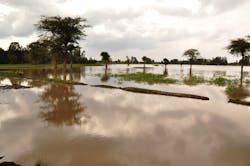Hurricane Maria Leaves Puerto Rican Town With Little Reliable Water
After Hurricane Maria, the town of Rincón, Puerto Rico did not have reliable drinking water for months. According to WJCT Public Media, waterborne diseases spread and there was a rise in gastrointestinal issues, scabies and even leptospirosis—a bacterial infection caused when fresh water is contaminated with rat urine.
Rincón resident Steve Tomar was in the position to help. Tomar is the vice chairman of the Rincón chapter of the Surfrider Foundation and director of the Blue Water Task Force, an organization which tests ocean water quality near beaches.
“Immediately after the storm, people were asking, ‘Can you do something about checking the wells and spring?’” Tomar said. “We said, ‘Well, we’re not set up for it but, yeah, we can do this.’”
The residents of Rincón resorted to the natural water sources like springs, wells and streams. They started with a small stream in a park near the downtown.
“This literally was where everybody who lived in downtown Rincón had to come for water,” Tomar said. “This was the only source they had.”
Tomar and his team started by testing for enterococcus, the only tests they had on hand. Enterococcus is a hardy bacteria that can survive in a marine environment. When he and his team got the supplies, they tested for bacteria, including fecal matter and other contaminants.
The team also started to branch out to the surround area. They gave training course to Boy Scout groups and anyone interested in learning on how to do water quality training. After a couple months, they tested most of the water sources within a six-hour radius. To notify people of their results, Tomar and his team put up color-coded signs.
A year after Hurricane Maria, Tomar samples every few weeks to monitor bacteria counts. He was reluctant to take on the task of testing drinking water in the past because he feared reaction from government agencies and the public health services. After Hurricane Maria, this was no longer a worry.
“And, of course, you do it, because this is the community,” he said. “‘These are your people, so whatever you can do to keep them healthy and informed, you do it.”
